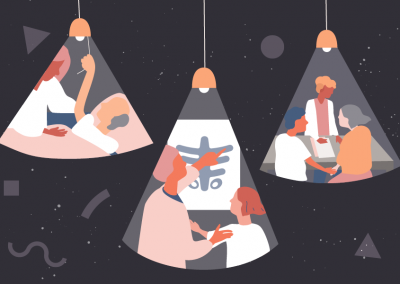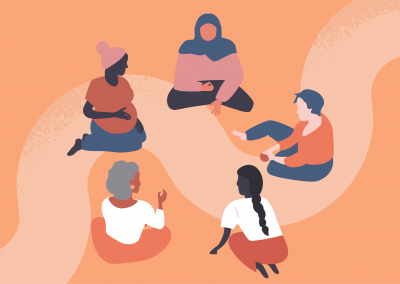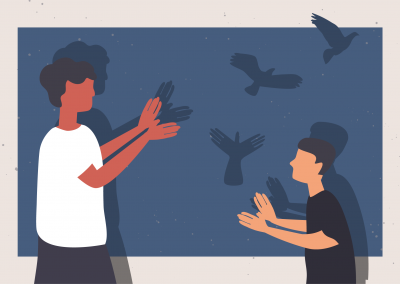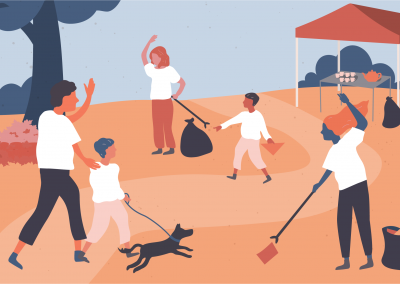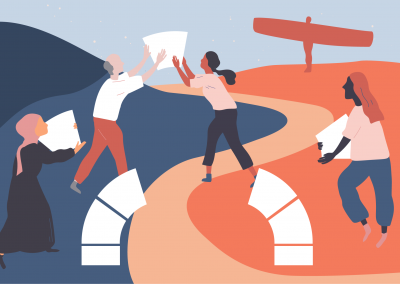Xenia
Building social integration through mutual learning and meeting as equals
‘It’s hard to chat. I’m terrible at chatting to people at parties,’ says Makena, an organiser at Xenia. ‘A lot of people give up on relationships because they’re not good at that bit, the small talk part. They want to fast forward to the part where they know each other.’
Xenia brings together women from different backgrounds to connect, share experiences and learn from one another. It began as a community group in Hackney and has since become a charity, recently working alongside local women in Sheffield to set up a new group there.
The heart of Xenia’s work is a weekly get-together. All levels of English are welcome and there’s an emphasis on welcoming women who have recently arrived in the community.
When Xenia was set up, there were a lot of conversations in the media about the need for people to integrate. But at the same time, there were a lot of cuts in the provision that had been there. Xenia evolved out of that moment.
‘We sought to bring women from across the community together because there was no space for their voices,’ Makena says. ‘Through community comes inclusion, understanding, sharing and learning. We provide childcare, pay people’s travel if needed, and meet at a time that we thought might suit people. Any woman can come to Xenia; you don’t have to sign up, you don’t have to make contact beforehand.’
Love for strangers
There is a Xenia session every Saturday morning. ‘If you’re new to Xenia, you arrive at the venue and you come in and see some other people are already there’, says Makena. ‘And that’s one of the most important moments. It’s so important to show people a warm welcome.’
Xenia means the love for strangers in Greek and really showing this love when someone walks in is core. Equally if someone hasn’t been for a while, the only thing that happens is they’ll be welcomed even more.
Women of all ages, cultures, nationalities, socio-economic backgrounds and immigration status come to Xenia. It’s a space where local relationships can form, across and beyond the confines of existing communities or social groups. It’s an incubator of social connection and integration.
The value of repetition
There’s a different theme each week, but the format of Xenia sessions is always the same.
‘Everyone will sit down, whoever’s facilitating will open, and we’ll explain what Xenia is and some guidelines for speaking and listening,’ says Makena. Doing this every week is ‘repetitive, but it’s important. It creates a sense of calm and familiarity. We remind everyone of our values: the idea that everyone has something to teach and everyone has something to learn, and that all women are welcome. Then we go round and everyone will say their name and something relating to the topic of the week.’
This consistency embeds Xenia’s relational norms and creates a safe, stable structure within which relationships can form, even when diverse perspectives and disagreements surface.
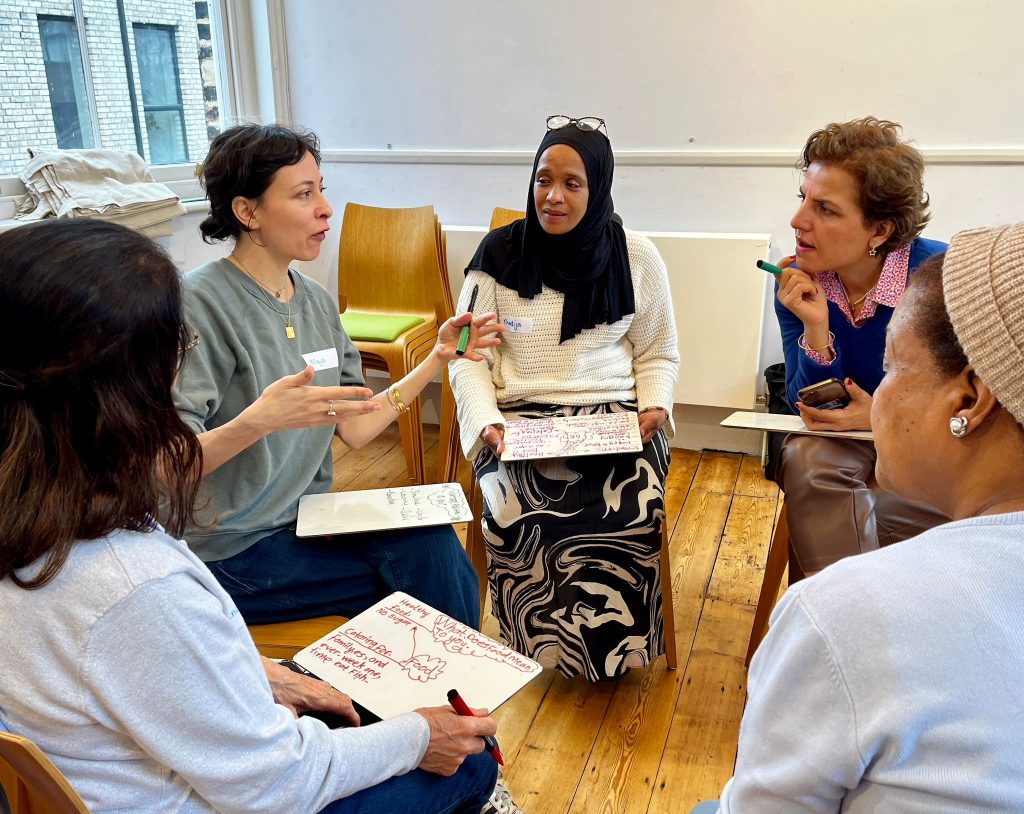
Photo credit: Xenia
Shared questions
‘One session the topic was women’s rights,’ says Makena. ‘That’s quite a big topic, which a lot of people have thoughts on. It’s important at the beginning that everyone gets to speak regardless of their level of English, so the first thing we said was just our name and the name of another important woman in our lives, maybe our mother, sister or friend, so we had the names of other women in the room.’
After its opening, the session unfolds, with the facilitator offering a sequence of questions and moving people into groups with a mixed level of language ability. ‘The initial question is straightforward’, says Makena. ‘In this case it might be Talk about a woman you admire, and people might say Rosa Parks, Michelle Obama, my next-door neighbour, my grandma…’ Then the groups come back together and share, before taking the next, slightly more complex question back to their group.
The format is simple, but carefully considered. The movement in and out of groups provides space for those with more limited English to seek clarification. Instructions and ideas can be repeated and re-explained. The session themes are chosen to be relatable, but also to ‘have some depth and meaning, to get beyond What are you doing on the weekend?’
‘Sometimes there’s also a creative activity,’ says Makena, ‘or some objects, or a bit of reading. Sometimes there’s a video, or a visitor who comes in and runs part of the session: an artist, maybe, or someone from a local service.’
Shared questions and shared activities take the pressure off making small talk. More natural, organic friendships can arise.
Mutual learning and non-hierarchical organisation
If this all sounds a bit like a coffee morning or a community English class, it’s not. What makes Xenia distinctive is their commitment to creating a space where women, regardless of their English level, meet as equals and are all invited to share their own understanding and knowledge. The organisation takes this principle into its governance too, working non-hierarchically throughout.
‘We set things up so that everyone learns from everyone else, whatever the topic,’ says Makena, ‘as a way of levelling some of those assumed hierarchies of the volunteer and the beneficiary, the teacher and the students, the people who can speak fluent English and those who are learning.’ Participants can progress from participant to facilitator to supporting on the organising team, but the structure remains flat. ‘There’s no teacher’, says Makena. ‘Instead one person facilitates the group. That rotates and all they do is set the questions.’
The commitment to mutual learning and non-hierarchical organisation is important. Xenia is about community, but it’s also about education and empowerment: supporting women to form genuinely reciprocal relationships and ‘find their voice in a small, safe setting.’
Safe spaces to disagree
Xenia’s sessions combine structure and space. ‘It’s not a free for all,’ says Makena. ‘The facilitator outlines the session plan, and that is structured and held, but within that things happen that you can’t control.’
‘I went to one session,’ she continues, ‘and the topic was Learning. That doesn’t sound very contentious, but of course you can’t control what happens in a session and people really talk about what is on their mind. That week we ended up talking about the war in Gaza, other wars in our various home countries, HIV Aids, what happens when we die… That was a really emotional session, but it also revealed how much trust had been built in the group. We disagreed on some of the topics, but there was an acknowledgement of how much we all have in common. It was a session that got me thinking about how important it is to have safe spaces to talk about things we don’t agree on, with people who don’t necessarily share our perspective. That’s rare.’
There are lots of safe spaces where people will have the same background or viewpoint or affiliation – but they can become exclusionary. We try to create a safe space that’s not a safe space where everyone’s the same. We’re not trying to create a space where no one’s ever challenged in their thinking.
Xenia’s values of welcome and hospitality are core to keeping the space safe. ‘Occasionally we have to remind people of them,’ Makena says.
The result is an environment where meaningful, trusting relationships can form between people who might hold opposing views – a significant outcome in the current climate.
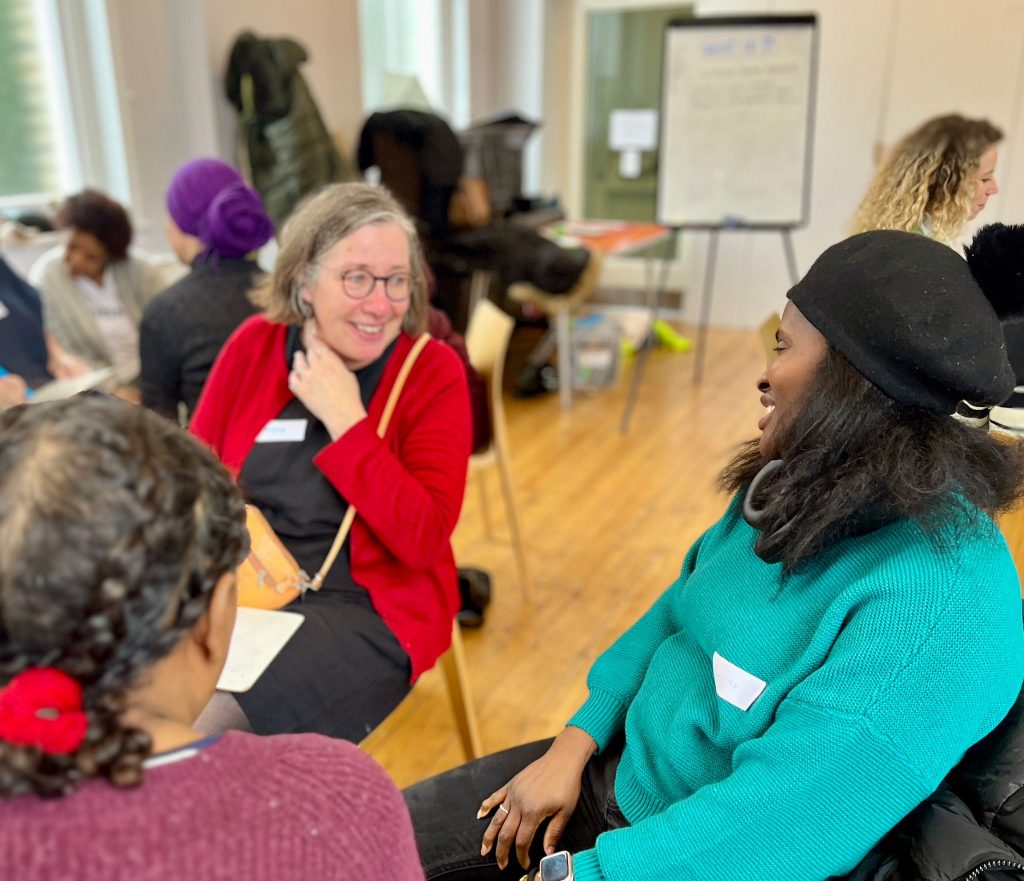
Photo credit: Xenia
Just being there
‘An important part of any friendship or relationship is being reliable’, says Makena. ‘One of the best things about Xenia is the regularity. We’ve missed very few sessions; we’ve missed ones that are literally on Christmas day. Apart from that we’ll try and run sessions every week. That’s such a key ingredient of community work and relationship building – just being there.’
Growing while keeping the essence
Xenia was founded in 2016. Now it’s growing. ‘When we started off we were just a group of local people,’ says Makena. ‘Now we’re a proper charity. But we try and maintain those standards of not having hierarchies within the working team. That’s the learning at the moment: How do we keep this non-hierarchical approach as we grow? It’s not straightforward.’
The organisation has a keen sense of the essence it’s trying to preserve. ‘If I look around at the start of a Xenia session, that’s how I want the world to be’, says Makena. ‘There’s a real diversity of people all being welcomed in one space, all engaged in conversation, connecting and sharing and learning from one another.’
‘So many people tell us: This is my sisterhood, this is my family.’
Reflection questions
Digging deeper
- Why do you think the structure and regularity of get togethers is so important in this example?
- How does a focus on building relationships enable mutual learning in this example? And vice versa?
- How can a charity at this stage preserve their essence as they spread and scale?
Applying the learning
- How and where is there space for mutual learning or non-hierarchical approaches in your context?
- How and where do you create safe spaces for disagreement within the work you do?
More stories
The Relationships Map
The Relationships Map is a space for anyone who believes in the importance of relationships to find one another, share ideas and resources, feel part of something bigger, and realise more than the sum of our parts.

